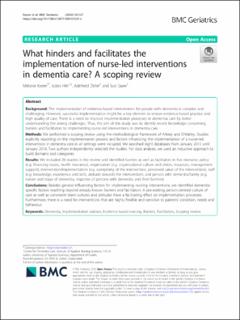| dc.contributor.author | Karrer, M. | |
| dc.contributor.author | Hirt, J. | |
| dc.contributor.author | Zeller, A. | |
| dc.contributor.author | Saxer, S. | |
| dc.date.accessioned | 2023-01-03T11:57:28Z | |
| dc.date.available | 2023-01-03T11:57:28Z | |
| dc.date.issued | 2020 | |
| dc.identifier.citation | Karrer, M., Hirt, J., Zeller, A. & Saxer, S. (2020). What hinders and facilitates the implementation of nurse-led interventions in dementia care? A scoping review. BMC geriatrics, 20(1), 1–13. | en_US |
| dc.identifier.uri | https://hdl.handle.net/11250/3040610 | |
| dc.description.abstract | Background
The implementation of evidence-based interventions for people with dementia is complex and challenging. However, successful implementation might be a key element to ensure evidence-based practice and high quality of care. There is a need to improve implementation processes in dementia care by better understanding the arising challenges. Thus, the aim of this study was to identify recent knowledge concerning barriers and facilitators to implementing nurse-led interventions in dementia care.
Methods
We performed a scoping review using the methodological framework of Arksey and O’Malley. Studies explicitly reporting on the implementation process and factors influencing the implementation of a nurse-led intervention in dementia care in all settings were included. We searched eight databases from January 2015 until January 2019. Two authors independently selected the studies. For data analysis, we used an inductive approach to build domains and categories.
Results
We included 26 studies in the review and identified barriers as well as facilitators in five domains: policy (e.g. financing issues, health insurance), organisation (e.g. organisational culture and vision, resources, management support), intervention/implementation (e.g. complexity of the intervention, perceived value of the intervention), staff (e.g. knowledge, experience and skills, attitude towards the intervention), and person with dementia/family (e.g. nature and stage of dementia, response of persons with dementia and their families).
Conclusions
Besides general influencing factors for implementing nursing interventions, we identified dementia-specific factors reaching beyond already known barriers and facilitators. A pre-existing person-centred culture of care as well as consistent team cultures and attitudes have a facilitating effect on implementation processes. Furthermore, there is a need for interventions that are highly flexible and sensitive to patients’ condition, needs and behaviour. | en_US |
| dc.publisher | BMC geriatrics | en_US |
| dc.rights | Navngivelse 4.0 Internasjonal | * |
| dc.rights.uri | http://creativecommons.org/licenses/by/4.0/deed.no | * |
| dc.subject | dementia | en_US |
| dc.subject | implementation science | en_US |
| dc.subject | evidence-based nursing | en_US |
| dc.subject | barriers | en_US |
| dc.subject | facilitators | en_US |
| dc.subject | scoping review | en_US |
| dc.subject | implementering | en_US |
| dc.subject | retningslinjer | en_US |
| dc.subject | veiledere | en_US |
| dc.title | What hinders and facilitates the implementation of nurse-led interventions in dementia care? A scoping review | en_US |
| dc.type | Journal article | en_US |
| dc.source.pagenumber | 1-13 | en_US |
| dc.source.volume | 20 | en_US |
| dc.source.journal | BMC geriatrics | en_US |
| dc.source.issue | 1 | en_US |
| dc.identifier.doi | https://doi.org/10.1186/s12877-020-01520-z | |

